Islamic Political Theology
Faith and Politics: Political Theology in a New Key
Series Editor: Fred Dallmayr, University of Notre Dame
Political Theology is a theme which straddles two major areas of inquiry: political philosophy and theology, or differently phrased: the realms of secular politics and the sacred. The relation is marked by difference, sometimes by tension or conflict. During the past century, such conflict reached a boiling point when the Nazi regime sought to co-opt or integrate the Christian population. In opposition to this attempt, a Confessing Church was formed which, under the leadership of Karl Barth, issued the Barmen Declaration (May 31, 1934) which insisted on the independence of faith from political power structures while, at the same time, guarding against the pure privatization of faith. In our time, it is important to remember this precedent because there are strong tendencies to push religion into similar dilemmas. This series will launch new investigations into the relations between faith and politics on a broad ecumenical and global level. Its guiding question will be, to what extent do different theologians or different political theologies make possible the prospect of a divinely sanctioned kingdom of peace and justice?
Recent Titles
Islamic Political Theology , Edited by Massimo Campanini and Marco Di Donato
Dietrich Bonhoeffer, Theology, and Political Resistance , Edited by Lori Brandt Hale & W. David Hall
The Legacy of the Barmen Declaration: Politics and the Kingdom , by Fred Dallmayr
In memory of professor Massimo Campanini
Islamic Political Theology
Edited by
Massimo Campanini and Marco Di Donato
LEXINGTON BOOKS
Lanham Boulder New York London
Published by Lexington Books
An imprint of The Rowman & Littlefield Publishing Group, Inc.
4501 Forbes Boulevard, Suite 200, Lanham, Maryland 20706
www.rowman.com
6 Tinworth Street, London SE11 5AL, United Kingdom
Copyright 2021 by The Rowman & Littlefield Publishing Group, Inc.
All rights reserved. No part of this book may be reproduced in any form or by any electronic or mechanical means, including information storage and retrieval systems, without written permission from the publisher, except by a reviewer who may quote passages in a review.
British Library Cataloguing in Publication Information Available
Library of Congress Cataloging-in-Publication Data
Names: Campanini, Massimo, 1954- editor. | Di Donato, Marco, editor.
Title: Islamic political theology / edited by Massimo Campanini and Marco Di Donato.
Description: Lanham : Lexington Books, 2021. | Series: Faith and politics: political theology in a new key | Includes bibliographical references and index.
Identifiers: LCCN 2021005524 (print) | LCCN 2021005525 (ebook) | ISBN 9781498590587 (cloth) | ISBN 9781498590594 (epub)
Subjects: LCSH: Islam and politics.Classification: LCC BP173.7 .I86945 2021 (print) | LCC BP173.7 (ebook) | DDC 297.2/72dc23
LC record available at https://lccn.loc.gov/2021005524
LC ebook record available at https://lccn.loc.gov/2021005525
 The paper used in this publication meets the minimum requirements of American National Standard for Information SciencesPermanence of Paper for Printed Library Materials, ANSI/NISO Z39.48-1992.
The paper used in this publication meets the minimum requirements of American National Standard for Information SciencesPermanence of Paper for Printed Library Materials, ANSI/NISO Z39.48-1992.
Contents
Massimo Campanini and Marco Di Donato
Catarina Belo
Leonardo Capezzone
Massimo Campanini
Oliver Leaman
Margherita Picchi
Pejman Abdolmohammadi
Driss Makboul and Mohamed Elghazi
Mohammed Hashas
Ahmad Bostani
Josep Puig Montada
Massimo Campanini and Marco Di Donato
Editing a book on political theology in Islam is a challenge. First of all because the expression political theology is ambiguous and open to diverse interpretations. Secondly, because we must oppose the widely sharedeven in the academyview that Islam is naturally theological-political since it is theocratic. The question in itself is simple: how can a religion like Islam, connecting heaven and earth, faith and society, worship and mundane action, not be political? Rather, the answer is difficult.
The concept unifying these elements is that of a religious community ( Umma ) which could be, at one and the same time, the privileged subject and the object of political theology. The idea of a religious community or Umma is pivotal in Islam, being charismatic (Watt 1980); therefore, Islam seems particularly fitted for political theology. Moreover, connecting politics and religion does mean in Islam connecting politics with jurisprudence, insofar as Islam is a normative religion (like Judaism) and, as is well known, the law ( sharia ) is of divine origin. Through the revealed basis of the law (the sharia ) and the consequent human elaboration of positive jurisprudence ( fiqh ), God made manifest His will both in social life and in politics: the law became the basis of Islamic political theology. Abu Hamid al-Ghazali (ca. 10561111), for instance, who was a celebrated jurist and professor of law, grasped the possible foundation of Islamic political theology linking together the dimension of religious science with the dimension of legal acts (al-Ghazali 2010).
Our subject is not so obvious, though. The texture of religion and state ( din wa dawla ) is not so automatic in Islam, if Patricia Crone, among others (and we are in the number too [see Campanini 2019]), was right in writing that most polities in [Islamic] history have been characterized by the distinction between the political and the religious spheres (Crone 2004, p. 14). Moreover, to stress only another point, a great number of contemporary hyper-conservative Muslims are apolitical, as most of the Salafis are very traditional in ethics and behavior but not necessarily engaged in politics (Di Donato 2018). Therefore, the problem of whether a political theology exists in Islam is open. This book will try to give a provisional but critical answer exploring a wide range of issues.
We would like to suggest a number of initial considerations, beginning with a definition. Political theology is a field of study revived in contemporary times, the 1920s of the past century, by the German jurist and philosopher of politics Carl Schmitt. Political theology affirms that political concepts and theological concepts are strictly linked and, in Schmitts opinion, that the concepts of politics are derived from theology (Schmitt 1922). Giovanni Filoramo put the question as follows:
[Political theology] is the historical and political study of the way theological concepts and representations of the divine in a particular religious tradition correspond with the forms and the dynamics of a particular structure of power and political authority. All this has two basic meanings: 1) the way political structures are mirrored in the theological conceptions; 2) and vice versa the way theological conceptions must be shaped in order to provide proper representations of divinity and sovereignty. The element that mediates between these trends is the religious community which is, at one time, the privileged subject and object of political theology. (Filoramo 2004, p. 347)
Another possible definition is the following: two aspects of political theology may be distinguished... one examines the theological implications of politics...; the other the political implications of theology (Assmann 2000). An even more detailed definition could include further dimensions of political theology: first of all, that political theology is the theological legitimization of a political order. If political theology is a kind of politics going back to God in order to realize its objectives and if the concept of God as the supreme legislator is a form of political theology, surely Islam had its own political theology in that, on the one hand, (almost) all its rulers sought the legitimization of their power in religion; and that, on the other hand, God is the main source of legislation and power.

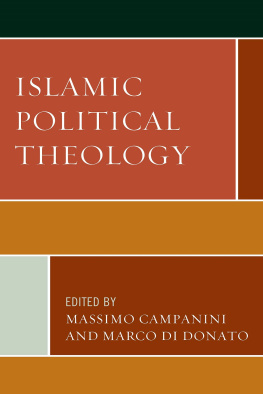
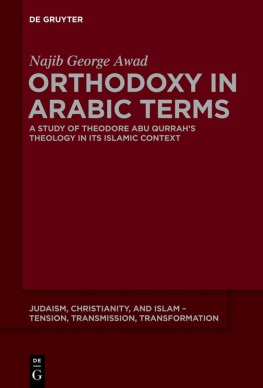


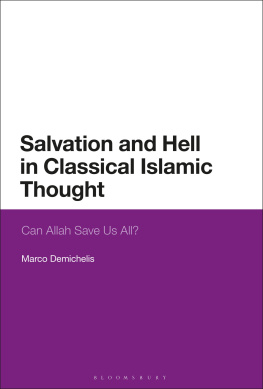
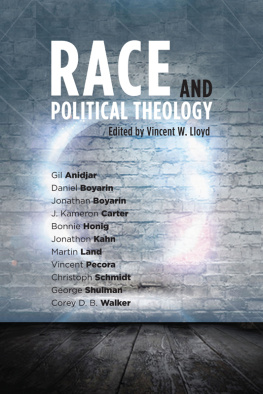
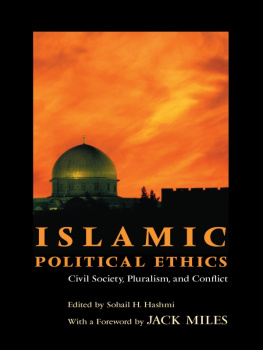
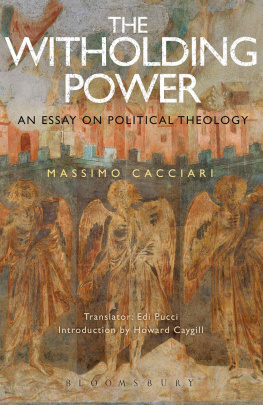
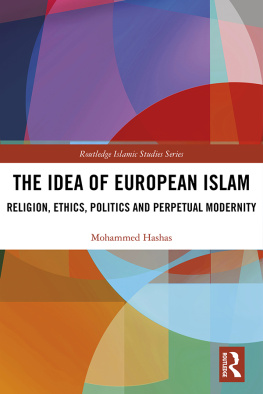
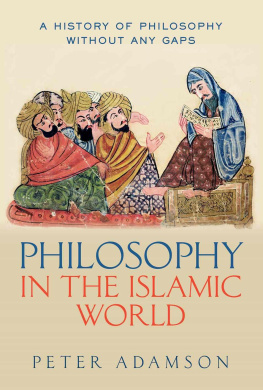

 The paper used in this publication meets the minimum requirements of American National Standard for Information SciencesPermanence of Paper for Printed Library Materials, ANSI/NISO Z39.48-1992.
The paper used in this publication meets the minimum requirements of American National Standard for Information SciencesPermanence of Paper for Printed Library Materials, ANSI/NISO Z39.48-1992.